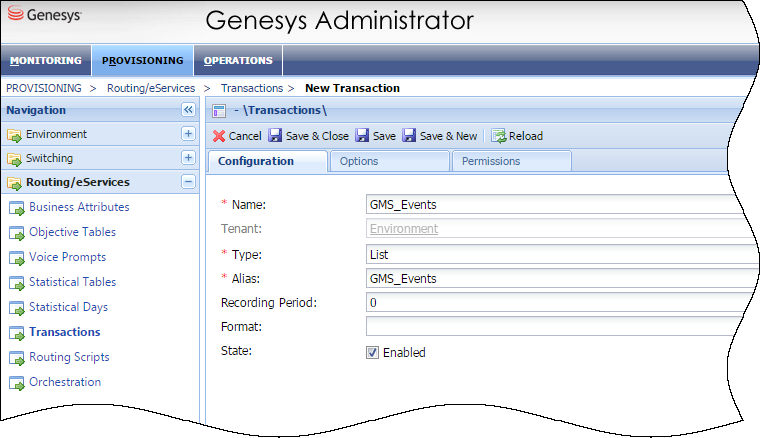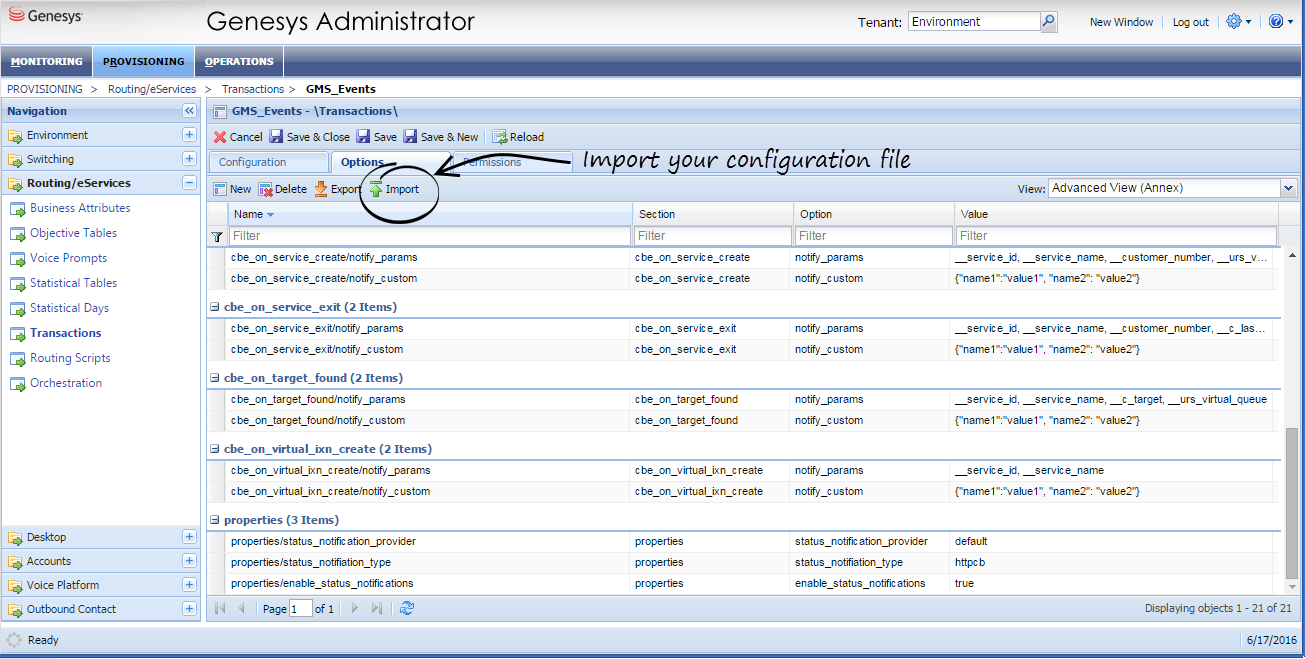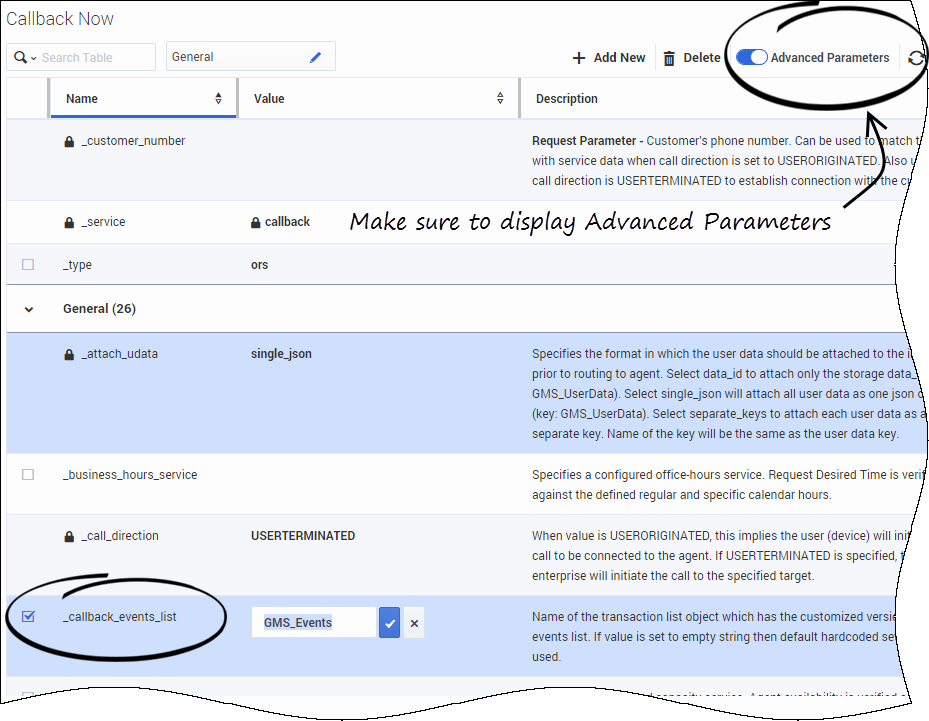_notification_reminder_buffer
Section: General
Default Value: 300
Valid Values: string
Changes Take Effect: Immediately
Modified: 8.5.211.01
Specifies the number of seconds before the callback dial time to trigger the Notification Reminder. By default, the reminder is sent 300 seconds (5 minutes) before the system dials the callback.
_enable_notification_reminder
Section: General
Default Value: false
Valid Values: boolean
Changes Take Effect: Immediately
Introduced: 8.5.211.01
True to enable the callback notification reminder capability. If both this option and the _enable_status_notification option are true, the Callback Service sends an additional _cbe_on_callback_reminder event notification a few seconds before the dial time. To specify when the _cbe_on_callback_reminder notification is sent, configure the _notification_reminder_buffer option.
_notification_reminder_buffer
Section: General
Default Value: 300
Valid Values: string
Changes Take Effect: Immediately
Modified: 8.5.211.01
Specifies the number of seconds before the callback dial time to trigger the Notification Reminder. By default, the reminder is sent 300 seconds (5 minutes) before the system dials the callback.
_enable_notification_reminder
Section: General
Default Value: false
Valid Values: boolean
Changes Take Effect: Immediately
Introduced: 8.5.211.01
True to enable the callback notification reminder capability. If both this option and the _enable_status_notification option are true, the Callback Service sends an additional _cbe_on_callback_reminder event notification a few seconds before the dial time. To specify when the _cbe_on_callback_reminder notification is sent, configure the _notification_reminder_buffer option.
_status_notification_debug
Section: no category
Default Value: false
Valid Values: true, false
Changes Take Effect: Immediately
If true, enables the debug mode for notification.
_status_notification_language
Section: no category
Default Value: false
Valid Values: String
Changes Take Effect: Immediately
Application language that matches one of the supported languages used for push notifications.
_status_notification_debug
Section: no category
Default Value: false
Valid Values: true, false
Changes Take Effect: Immediately
If true, enables the debug mode for notification.
_status_notification_target
Section: General
Default Value:
Valid Values: String
Changes Take Effect: Immediately
Target to which to publish notifications according to the _status_notification_type notification type:
- If _status_notification_type = httpcb, then set _status_notification_target to the target URL to which to push the notifications.
- If _status_notification_type = orscb, then set _status_notification_target to the target ORS session ID.
This option is mandatory.
_status_notification_type
Section: General
Default Value:
Valid Values: httpcb, orscb
Changes Take Effect: Immediately
Notification type to use when publishing the notification. You should use httpcb in most cases. Use orscb to publish notifications in Orchestration Server for advanced ORS-based customizations.
_enable_status_notification
Section: General
Default Value: false
Valid Values: false, subscribe_notify, notify
Changes Take Effect: Immediately
Enables the callback status notifications and defines the notification subscription for the Callback application.
- false – The Callback Service assumes that the client application has already subscribed for status notifications.
- subscribe_notify – The callback application will subscribe for status notification on behalf of the client application.
- notify – The client application has already subscribed for status notifications.
This option will override the settings in the GMS events transaction list.
This option is mandatory.
Enable Status Notifications
Modified in 8.5.211
| Version | Update |
|---|---|
| 8.5.105 | The Callback service can now publish notifications to GMS that distributes these notifications to the target specified in the callback's service request, and consequently, to the subscribers of these notifications. The possible targets can be an ORS session of an existing GMS service (orscb notification type) or any URL (httpcb notification type). |
| 8.5.107 | You can now receive two types of notifications: Callback SCXML and additional GMS Callback notifications.
Important By default, this feature is turned off for all callback services. |
| 8.5.211 | GMS can now send a notification reminder event before the callback is dialed. |
| 8.5.232 |
|
To enable Callback Status Notifications (SCXML), you can either:
- Enable the Default Status Notifications (from SCXML).
- Create a Transaction Event object that overwrites the list of default notifications and assign it to your Callback Service. You can configure additional GMS Callback Status notifications by using the Transaction List entries which override the defaults. In that scenario, the notifications will only report the events specified in this Transaction List.
- Add notifications parameters to your Callback Services query.
Callback will send the notification events and provides two subscription modes to receive them:
- subscribe_notify—Callback subscribes for your application to the notifications.
- notify—Your application must subscribe to receive events.
Enable Default Status Notifications in a Callback Service
To receive default callback status notifications (SCXML), open the Service Management User Interface and navigate to your Callback Service (in the Configured Services panel).
Enable Advanced Parameters and configure the following options in the General section:
- _enable_status_notification= subscribe_notify
- _status_notification_type= httpcb (or orscb)
- _status_notification_target = Target URL (or the ORS session id if _status_notification_type = orscb)
You can add the following additional parameters to your Callback queries:
- _status_notification_debug = false—Set to true to enable the debug mode for notification.
- _status_notification_language = <language> where the language matches one of the supported languages used for push notifications.
The _status_notification_debug option defines the URL where the notifications will be pushed using HTTP POST requests.
Enable Reminder Notifications
If you enabled default status notifications, you can also enable the Reminder Notifications in your Callback service.
- Configure _enable_notification_reminder to true and, by default, the system will send the _cbe_on_callback_reminder notification event 300 seconds before the dial time of the call.
- You can change the value of the _notification_reminder_buffer option to get the reminder notification earlier or later. The default value is 300 seconds.
The Reminder feature periodically checks the EWT retrieved from URS for each call.
- If URS EWT < _notification_reminder_buffer, the Reminder feature sends the reminder event status notification.
- If not, depending on the EWT's value, the Reminder feature schedules the next check for the call:
- Every 30 seconds if URS EWT is not defined,
- Every 45 seconds if URS EWT < 600 seconds,
- Every 300 seconds if 600 seconds < URS EWT < 3600 seconds
- Every 1800 seconds if URS EWT > 3600 seconds
Limitation: The frequency of the Reminder periodical checks is not configurable.
Overwrite Default Notifications with a Transaction List
Start by defining a Transaction List object that includes the notifications and the associated events triggering notifications.
Open Genesys Administrator. In PROVISIONING > Routing/eServices > Transactions, click New to create the GMS_Events list.
In the Options tab, create a properties section with:
- _enable_status_notification = subscribe_notify
- _status_notification_provider = <customerprovider> or blank for default provider
- _status_notification_type = httpcb
- _status_notification_target=<Target URL>
- _status_notification_debug= false
- _status_notification_language = <language> where the language matches one of the supported languages used for push notifications.
Then, create a section for each subscribed event and define the data that your application needs to receive in the notification event.
- notify_params—The comma-separated list of callback parameters to retrieve. See the reference to get the list of parameters that can be retrieved. Note that you can also retrieve some specific user data there in addition to callback parameters.
- notify_custom—(Optional) A JSON object of the custom attached data to send in the notification in addition to the callback parameters set in notify_params.
- Either click New to add the following options or copy the source below to a GMS_Events.cfg file that you can import in your Transaction List.
- You do not have to include all the events listed below.
- The notify_custom parameter should suite your use case or can be removed if not needed.
In the XML sample below, c_target must match c_target as provided by URS.
[properties]
_enable_status_notification = notify
_status_notification_provider =
_status_notification_type = httpcb
_status_notification_target =<your URL>
[_cbe_on_service_create]
notify_params = _service_id, _service_name, _customer_number, _urs_virtual_queue
notify_custom = {"name1":"value1", "name2": "value2"}
[_cbe_on_virtual_ixn_create]
notify_params = _service_id, _service_name
notify_custom = {"name1":"value1", "name2": "value2"}
[_cbe_on_target_found]
notify_params = _service_id, _service_name, c_target, _urs_virtual_queue
notify_custom = {"name1":"value1", "name2": "value2"}
[_cbe_on_dial_init]
notify_params = _service_id, _service_name, _customer_number, c_dialed_number
notify_custom = {"name1":"value1", "name2": "value2"}
[_cbe_on_dial_done]
notify_params = _service_id, _service_name, _customer_number, c_dialed_number, c_call_result, c_call_num_attempt
notify_custom = {"name1":"value1", "name2": "value2"}
[_cbe_on_connect_treatment_start]
notify_params = _service_id, _service_name, _customer_number, _vq_for_outbound_calls, c_dialed_number
notify_custom = {"name1":"value1", "name2": "value2"}
[_cbe_on_customer_queued]
notify_params = _service_id, _service_name, _customer_number, _vq_for_outbound_calls, c_dialed_number
notify_custom = {"name1":"value1", "name2": "value2"}
[_cbe_on_route_to_agent]
notify_params = _service_id, _service_name, _customer_number, _urs_virtual_queue, c_agent_id,
c_agent_extension
notify_custom = {"name1":"value1", "name2": "value2"}
[_cbe_on_service_exit]
notify_params = _service_id, _service_name, _customer_number, c_last_dialed_number, c_termination_type
notify_custom = {"name1":"value1", "name2": "value2"}
[_cbe_on_callback_scheduled]
notify_params=_customer_number,_phone_number,_desired_time
notify_custom={"state":"scheduled"}
[_cbe_on_callback_rescheduled]
notify_params=_customer_number,_phone_number,_desired_time
notify_custom={"state":"rescheduled"}Add the Event Transaction List to the Callback Service
Edit the Advanced Parameters in the General section of your Callback Service.
Set the _callback_events_list to the name of the Transaction List created above, GMS_Events in our example.
Callback Status Notifications Events
Callback notifications consist of a JSON object which contains:
- deviceId—The custom id provided at subscription time by the subscriber.
- message—The notification message as defined in the Callback Events Transaction List.
- timestamp—The timestamp for this notification.
- _service_id—The ID of the service which sent the notification.
- _service_name—The name of the service which sent the notification.
The Notification events can include some additional attributes detailed in this table. Check the Notification Event reference to get the list of attributes available for a given notification.
| Optional attributes | Description | Example |
|---|---|---|
| c_target | A selected target that specifies the agent/queue resource that will process this request. | "c_target": { "agent": "KSippola", "dn": "7001", "id": "Customer_Service", "place": "SIP_Server_Place1", "resource": "7001", "return": "target", "stat_value": "0", "switch": "SIP_Switch", "type": "GA", "vq": "SIP_VQ_SIP_Switch" } |
| c_agent_id | Equals to c_target.id. | "c_agent_id": "Customer_Service" |
| c_agent_extension | The agent's DN target (equals to c_target.dn). | "c_agent_extension": "7001" |
| c_dialed_number | The customer number. | "c_dialed_number": "5115" |
| c_call_result | Indicates the _genesys.ixn.callState state. Possible values are listed in the IxnIntfObjectModel page. | "c_call_result": "0" |
| c_call_num_attempt | The number of outbound call dialing attempts. | "c_call_num_attempt": "1" |
| c_termination_type | The termination type, also known as Disposition value. It equals to the _CB_DISPOSITION value. | "c_termination_type": "COMPLETED.AGENT" |
The following JSON code is an event sample where the notify_custom parameter was configured to {"name1":"value1", "name2": "value2"}.
{
"event_id": "_cbe_on_service_create",
"timestamp": "1467575991",
"_service_id": "445-20e740d3-8458-43d6-834d-3713c3385bac",
"_service_name": "samples_dev",
"_callback_state": "QUEUED",
"_customer_number": "5115",
"_urs_virtual_queue": "SIP_VQ_SIP_Switch",
"name1": "value1",
"name2": "value2"
}
{
"event_id": "_cbe_on_virtual_ixn_create",
"timestamp": "1467575992",
"_service_id": "445-20e740d3-8458-43d6-834d-3713c3385bac",
"_callback_state": "QUEUED",
"name1": "value1",
"name2": "value2"
}
{
"event_id": "_cbe_on_dial_init",
"timestamp": "1467575992",
"_service_id": "445-20e740d3-8458-43d6-834d-3713c3385bac",
"_service_name": "samples_dev",
"_callback_state": "QUEUED",
"_customer_number": "5115",
"c_dialed_number": "5115",
"name1": "value1",
"name2": "value2"
}
{
"event_id": "_cbe_on_dial_done",
"timestamp": "1467576012",
"_service_id": "445-20e740d3-8458-43d6-834d-3713c3385bac",
"_service_name": "samples_dev",
"_callback_state": "QUEUED",
"_customer_number": "5115",
"c_dialed_number": "5115",
"c_call_result": 0,
"c_call_num_attempt": 1,
"name1": "value1",
"name2": "value2"
}
{
"event_id": "_cbe_on_connect_treatment_start",
"timestamp": "1467576012",
"_service_id": "445-20e740d3-8458-43d6-834d-3713c3385bac",
"_service_name": "samples_dev",
"_callback_state": "QUEUED",
"_vq_for_outbound_calls": "VQ_GMS_REP_SIP_Switch",
"c_dialed_number": "5115",
"name1": "value1",
"name2": "value2"
}
{
"event_id": "_cbe_on_customer_queued",
"timestamp": "1467576016",
"_service_id": "445-20e740d3-8458-43d6-834d-3713c3385bac",
"_service_name": "samples_dev",
"_callback_state": "QUEUED",
"_vq_for_outbound_calls": "VQ_GMS_REP_SIP_Switch",
"c_dialed_number": "5115",
"name1": "value1",
"name2": "value2"
}
{
"event_id": "_cbe_on_target_found",
"timestamp": "1467576016",
"_service_id": "445-20e740d3-8458-43d6-834d-3713c3385bac",
"_service_name": "samples_dev",
"_callback_state": "QUEUED",
"_urs_virtual_queue": "SIP_VQ_SIP_Switch",
"c_target": {
"agent": "KSippola",
"dn": "7001",
"id": "Customer_Service",
"place": "SIP_Server_Place1",
"resource": "7001",
"return": "target",
"stat_value": "0",
"switch": "SIP_Switch",
"type": "GA",
"vq": "SIP_VQ_SIP_Switch"
},
"name1": "value1",
"name2": "value2"
}
{
"event_id": "_cbe_on_service_exit",
"timestamp": "1467576291",
"_service_id": "445-20e740d3-8458-43d6-834d-3713c3385bac",
"_service_name": "samples_dev",
"_callback_state": "QUEUED",
"c_termination_type": "COMPLETED.AGENT_CONNECTED",
"name1": "value1",
"name2": "value2"
}Reference for Notification Events
| Event Name | List of attributes specific to this event | When this event is triggered |
|---|---|---|
| _cbe_on_service_create |
|
As soon as the callback service (ORS session) is started. |
| _cbe_on_virtual_ixn_create | When the virtual interaction is successfully created in URS. | |
| _cbe_on_target_found |
|
When the callback has found the target and URS reports the target to ORS. |
| _cbe_on_dial_init |
|
When the dialing to the customer is started. Note: This behavior applies to both standard and preview callback. |
| _cbe_on_dial_done |
|
When the dialing result is known. Starting in 8.5.232, the _cbe_on_dial_done event is now sent for each dial request, not just one time.
Important Only _genesys.ixn.callState types related to dial tone will be mapped with the c_call_result attribute of the _cbe_on_dial_done event. Refer to the IxnIntfObjectModel to get the list of call states. |
| _cbe_on_connect_treatment_start |
|
When the greeting treatment is started right after the successful CPD. |
| _cbe_on_customer_queued |
|
In User Terminated scenarios, as soon as the onconnect treatment is over, the virtual interaction becomes routable and the customer is placed into a queue to wait for an agent. |
| _cbe_on_route_to_agent |
|
When the call is transferred from Routing Point to the agent. |
| _cbe_on_service_exit |
|
In all exit scenarios. Starting in 8.5.232, the _cbe_on_service_exit event is always sent at the end of the Callback strategy before the subscription is removed. Its parameters, such as the c_last_dialed_number parameter, are set in the different states of the strategy, according to the status of the Callback. |
| _cbe_on_callback_scheduled |
|
When a callback in SCHEDULE status is created. |
| _cbe_on_callback_rescheduled |
|
When a callback in SCHEDULE status is re-scheduled. |
| _cbe_on_callback_cancelled |
|
When the callback is canceled. |
| _cbe_on_callback_status_updated |
|
When the _callback_state field is updated by a REST query. This can be due to ORS updates. |
_cbe_on_callback_reminder
|
By default, you receive the reminder event 300 seconds before the dial time of the call. Configure _enable_notification_reminder to true to enable this event and change the value of _notification_reminder_buffer to get the reminder earlier or later. | |
| _cbe_on_callback_submitted |
|
When the callback is submitted for ORS execution. |
| _cbe_on_callback_resubmitted | When the callback is re-submitted for ORS execution. | |
| _cbe_on_callback_submit_failed | When submit for execution fails. | |
| _cbe_on_callback_processing_failed |
|
When the callback processing fails. |
| _cbe_on_callback_queued |
|
When the callback is successfully submitted and its state changed to QUEUED. |




